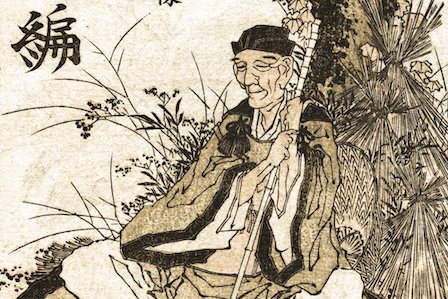“To translate from one language into another is a fearsome task. It is fitting punishment for that human pride which led to the great confusion of languages.” So begins Nobuyuki Yuasa in his introduction to a volume of translated travel writings by the classic Japanese poet Bashō.
The mixed haiku and prose compositions included date originally from between 1684 and 1689, and this translated edition was published in 1966. Despite both gaps in time, the compositions feel vivid and immediate and more modern than you might expect, if a bit stiff and formal. I’m inexperienced with reading translated works, and the accessibility of The Narrow Road to the Deep North was a welcome surprise.
Yuasa uses a fairly free-form four-line structure for his translated haiku in order to convey the sense of the lines if not their syllabic structure. I often felt the loss of the Japanese’s cadence and music in the translated poems, and wished I could read them in their original language. Considering the gulfs of history, culture, and language which Yuasa had to cross in order to bring Bashō’s journeys to life for modern English readers, even an incomplete success is pretty impressive.
My favorite haiku from the collection:
Settled in trap-pots,
Octopuses may be exulting
In their ecstasy of a single night
Under the moon of summer.
(from The Records of a Travel-Worn Satchel, the third of the five travelogues included in the volume)
Bashō’s own voice, when it is glimpsed, is the best part of the book. A mix of wry wit, sensuous joy, and zen detachment colors the works with his characteristic attitude to the world as he journeys through it. In the first travelogue, The Records of a Weather-Exposed Skeleton, the weather-exposed skeleton is Bashō himself – what he expects to have become by the end of the trip. I get the feeling that this kind of metaphoric device is common to the Japanese poetic tradition, as Bashō and others use it liberally in many situations to refer to themselves and others. Near to the end of the Narrow Road, Bashō writes a farewell haiku to a friend he must part ways with, saying:
Farewell, my old fan.
Having scribbled on it,
What else could I do but tear it
At the end of summer?
By the end, the poems and prose succeed in creating a strong bond of empathy between the reader and the poet. At least, they did in my own case. I finished the volume with an image lingering in my mind of an ageing searcher for truth, beauty, and enlightenment. Bashō, a man who was often plagued by illness, loneliness, and disappointment. A man who (in the words of Yuasa) “sought a vision of eternity in the things that are, by their own very nature, destined to perish” and who “set up a monument against the flow of time.”
The Narrow Road to the Deep North and Other Travel Sketches
Matsuo Bashō
Translated by Nobuyuki Yuasa
Penguin Classics, 1966

